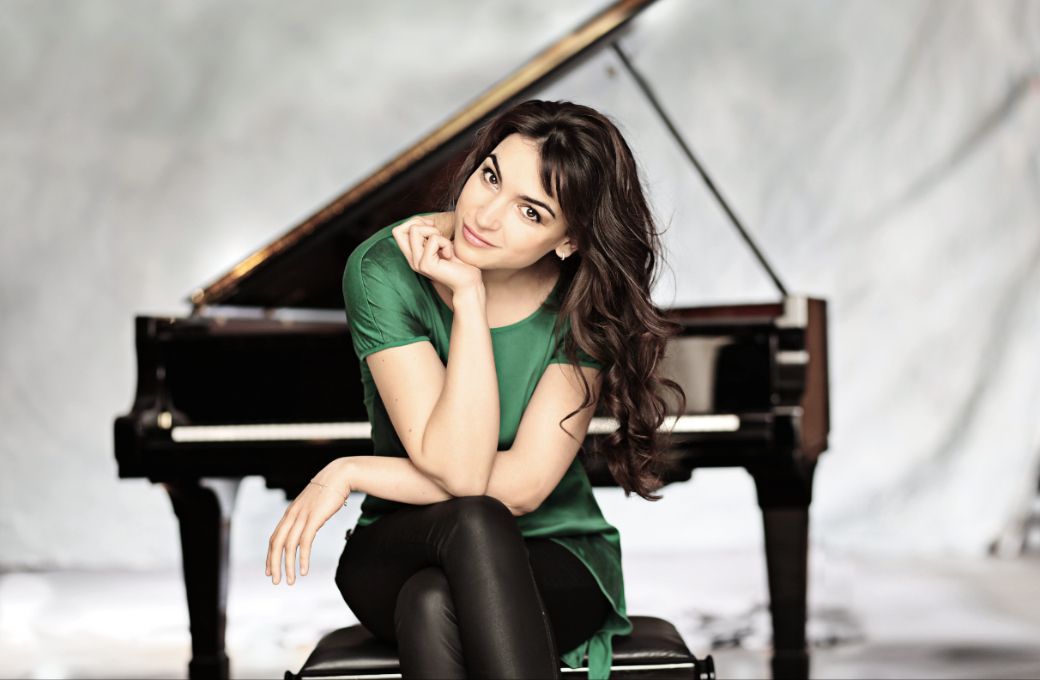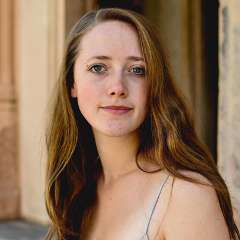Olga Scheps and Lena-Lisa Wüstendörfer seem genuinely delighted to be working together. The German pianist has played with Wüstendörfer’s Swiss Orchestra several times over the years, and already once as part of Andermatt Music. This autumn, once again, they will be reunited in the Alpine location.

Conductor Lena-Lisa Wüstendörfer has been artistic director of Andermatt Music since early 2022, structuring the season around a series of pillars or central themes: an international stage, a series of “Swiss classics”, and a focus on local traditional music under the heading Local Roots. This year, the season in Andermatt opens in late September with a concert by the Budapest Festival Orchestra, a gala concert with Jeanine De Bique, and a soirée of folk music from across Switzerland.
Ahead of this, Wüstendörfer and the Swiss Orchestra will be touring the “Tell, Swiss Legend” programme with Olga Scheps, featuring Rossini’s William Tell Overture, Swiss composer Hans Huber’s Tell Symphony, and Tchaikovsky’s First Piano Concerto. (William Tell, in case anyone needed reminding, is the legendary Swiss folk hero, marksman and mountaineer, who assassinated a tyrannical Habsburg bailiff and inaugurated the country’s independence.)
With a glowing smile, Olga Scheps tells me she’s very much looking forward to returning to Andermatt. “Up in the mountains, the air is so fresh and clean, and the environment is absolutely beautiful. It gives you even more energy for the performance.” Her words towards the director are equally warm. “I really love to perform with Lena-Lisa. She’s a wonderful conductor, very passionate, very detailed, really inspiring to work with.” The feeling is mutual. “It’s a pleasure to play with Olga,” Wüstendörfer says. “It always feels so organic. There is a kind of an understanding, but without too many words.”
Before the concert in Andermatt in November, the two artists will have had a chance to showcase the programme across Switzerland – St Gallen, Zürich, Bern, Zug. In the spring, they’ll take the show on the road to Liechtenstein. Wüstendörfer explains that “an aspect of Swissness” is a cornerstone of the Andermatt philosophy, with its resident Swiss Orchestra shedding light on the Swiss symphonic repertoire, some of it lesser-known. Here, she tells me, her idea was to contrast two visions of the William Tell story, one gentler and one more dramatic, one Italian and one Swiss, one well-known and one a little less famous. There’s more to the story, in other words, than the arrow and the apple.
Tchaikovsky, too, occasionally ventured into Swissness, notably in the tone poem Manfred, based on Lord Byron’s metaphysical drama of a tortured noble in the Bernese Alps. The composer spent some time researching it during a stay in Davos. On previous trips to the country in the 1870s, Tchaikovsky had worked on Yegengy Onegin, his Violin Concerto (completed in less than a month), and The Maid of Orleans. It seems he found the atmosphere clarifying.
Olga Scheps sees Tchaikovsky’s Piano Concerto (1875) as a natural fit with the programme, thematically speaking. She mentions the concerto’s strong melodic roots in folk music – “folk songs, folk dances, mainly from Ukraine” – and its intricate sense of storytelling. “The concerto is full of different colours, it’s very passionate music with a lot of drama going on, a lot of creativity, many dialogues between different instruments and the piano. I feel like I’m sometimes a soloist, sometimes part of the orchestra.” The piece has a special place in Scheps’ repertoire. When she speaks about the piece, you get a sense of a longstanding, intimate connection. “The passion, the lyric parts, the sadness, and the beautiful, very, very open and happy ending of the piece – it all very much resonates. It’s music which has sadness and tragedy, but it transforms to so much joy and light.”
When I ask her about her personal interpretation, her approach to the piece, her eyes light up. “I feel like I can let out a lot of passion and very deep feelings. I feel very comfortable expressing these emotions through this music.” She smiles. “Of course, every evening it’s a little different because we are all humans and we feel slightly different every day.”
This might be more obvious than usual in a place like Andermatt, where the stage brings performers and audience close together, quite literally. Wüstendörfer is proud of this quirk. “I think Olga was probably a little bit surprised the first time she played in Andermatt, because the first row of the audience is about one and a half meters away.” No “safety gap” here, she adds, “between the musicians and the audience.”
When I ask the pianist what it’s like to play such emotional music at such close quarters, she points out that her preferred repertoire – Beethoven, Mozart, Chopin, Liszt – was historically performed in quite intimate settings, where people were very close to the instrument. “And the instruments used to be much quieter than modern pianos. So one big part of the evolution of the piano was that the instruments became simply louder and bigger because the concert halls became bigger.” In other words, it’s a natural fit.
She waxes lyrical when asked about her relationship to Tchaikovsky’s music in particular: “I love playing Tchaikovsky. I think this is extremely lyrical, beautiful music that talks to our soul, sometimes in a fairy-tale way. It talks about love, about missing somebody, about sadness, all these very human emotions.” Chopin, too, holds a special place in Olga Scheps’ heart, “because he is very close to the instrument, and because his music is very personal.” She tells me she’s also been pursuing a renewed interest in Clara Schumann’s work, recently recording her Concerto for Piano and Cello in A Minor.
As a pianist, she feels lucky to have such an abundance of repertoire to choose from. She tells me she’s always liked playing these more passionate pieces in front of an audience. “I think that when I perform in front of people, I'm even more open in terms of expression than when I'm playing alone in my practice room.” Lena-Lisa Wüstendörfer adds: “I think Olga is an excellent interpreter of this Romantic music, Rachmaninoff and Tchaikovsky, these pieces where you have to create different worlds in music.”
Bringing together different worlds is an inherent part of the Andermatt philosophy. Wüstendörfer describes the village, and the glimmering modern hall at its heart, as “a kind of cultural meeting point where people from the region meet with people from further away, from other cities, but also with people from abroad.”
This desire for a wider audience is something she has always actively cultivated. Andermatt Music has never been afraid of bridging boundaries between classical and popular music, namely in the context of The Bash, a fusion event which this year welcomes Swiss pop singer Bligg. Wüstendörfer imagines the event as “something different from a collaboration where a symphony orchestra just accompanies the pop act, which is done a lot nowadays” and instead “more of a dialogue between the pop music and the classical music. So you will hear purely classical pieces from Beethoven or from some Swiss composers from the 19th century while Bligg and his crew are still on stage.”
The desire to show a contrasting image of what constitutes “Swissness” in 2025 is obviously strong. “We are constantly trying to optimise,” Wüstendörfer tells me with a smile, “to see what works, what probably doesn’t work, and then to find out why, and change accordingly. We are always trying to get better.”
This sense of working together across cultural and geographical divides also animates Scheps. “It’s really a very beautiful experience, to perform with people we don't know.” She describes the strangeness of meeting someone briefly, sharing a single rehearsal, and then stepping onto the stage together. On some level, “You really don’t know the person, but through the music you'll find a very deep connection.” Clearly, some of these connections are built to last.
Olga Scheps is on tour with Lena-Lisa Wüstendörfer and the Swiss Orchestra from 21st–26th November. They perform at Andermatt Music on 30th November.
See upcoming listings for Andermatt Music.
This article was sponsored by Andermatt Music.


